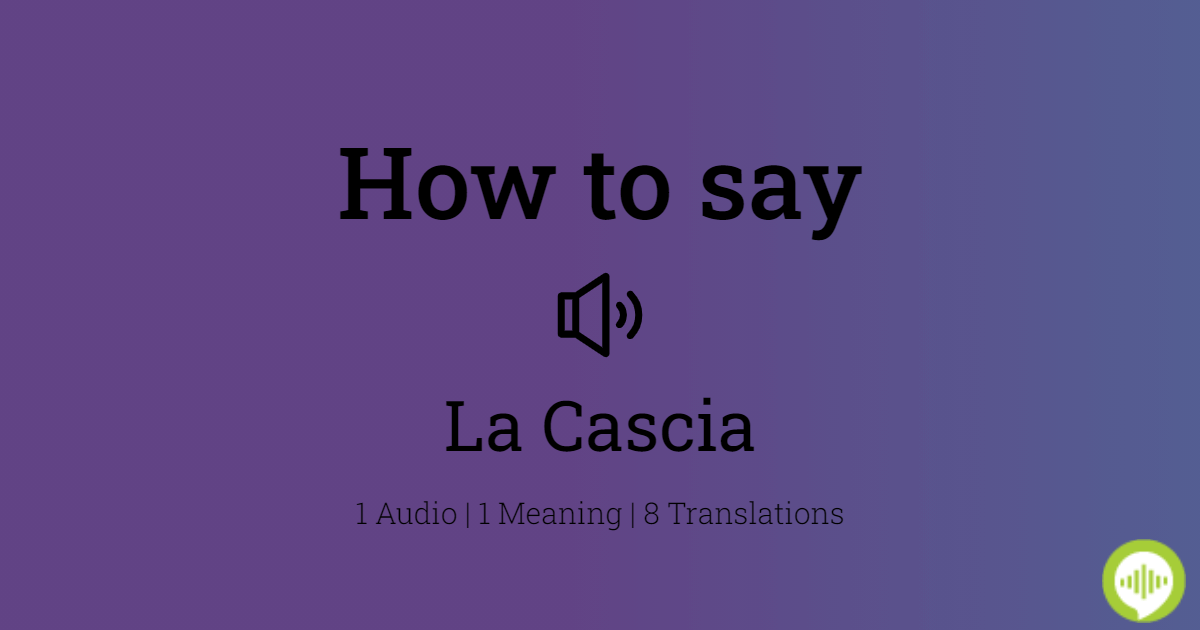How often have you come across a last name that leaves you guessing its pronunciation? Lacascia, with its roots deeply embedded in Italian heritage, stands as one such name that prompts curiosity and often requires a gentle nudge for correct enunciation. This name, which rolls off the tongue gracefully in its native vernacular, might mystify those unfamiliar with Italian phonetic nuances. so, let’s see How Do You Pronounce Lacascia?
The phonetic intrigue of Lacascia is tied to a blend of linguistic history and cultural evolution. Traditionally pronounced as ‘La-KAS-ya,’ it reflects the Italian tendency to marry syllables smoothly. In the realm of linguistics, understanding such a pronunciation quirk not only bridges cultural gaps but also enhances our appreciation of global name etymologies. It’s a reminder of the inherent beauty in language variance.
Lacascia is pronounced as “La-KAS-ya,” with emphasis on the second syllable. The “ci” in Italian sounds like the English “ch,” giving the name its distinct pronunciation. This phonetic approach aligns with Italian language rules, ensuring accuracy when saying the surname.

How Do You Pronounce Lacascia?
Pronouncing Lacascia can be a bit tricky, especially if you’re not familiar with Italian names, then the question ‘”How Do You Pronounce Lacascia?” becomes more interesting. The name Lacascia is Italian, and like many Italian words, it follows specific pronunciation rules. In its native tongue, it’s typically pronounced ‘La-KAS-ya’. The emphasis is on the second syllable, which is a common trait in Italian pronunciation. Understanding these patterns helps convey the name correctly in conversation.
Italian pronunciation rules might seem different, but they are predictable with practice. For example, the “ci” in Italian is pronounced like “ch” in English. Thus, in Lacascia, the “c” sound is soft, making it sound like ‘ch’. Such little details are key to getting the pronunciation right. With time, these patterns become almost like second nature.
Many people mispronounce Lacascia without knowing the intricacies of its phonetics. This is especially true for non-native speakers who may find certain sounds challenging. Often, the mistake lies in using an English phonetic approach for Italian names. Learning the correct pronunciation is important as it shows respect for cultural heritage. Plus, it makes communication smoother and more effective.
To better understand these principles of Pronounce Lacascia and find the answer of How Do You Pronounce Lacascia? A quick overview of similar Italian names can be beneficial. Names like ‘Giacomo’, ‘Francesca’, and ‘Lucia’ follow similar phonetic rules. Practicing with these examples can improve your Italian pronunciation skills significantly. Gradually, pronouncing Lacascia correctly will be a breeze. You’ll appreciate the rich linguistic traditions hidden in these names.
Traditional Italian Pronunciation of Lacascia
The traditional Italian pronunciation of Lacascia involves a fluid combination of sounds. Italian words typically stress the penultimate, or second to last, syllable. In this case, Lacascia becomes ‘La-KAS-ya’. The emphasis on the “KAS” gives the name a musical quality. Understanding this can help with practicing other Italian names as well.
Italian language sounds are often softer and more melodic compared to English. This sound pattern is evident in many Italian surnames. For example, the “ci” in Lacascia sounds like “ch” as in ‘chocolate’. It’s a sound many find pleasant and unique. These patterns are consistent across the Italian language, aiding in pronunciation learning.
To practice, repeat Lacascia a few times slowly, focusing on each syllable. Break it down to ‘La’, then ‘KAS’, and finally ‘ya’. The smoother the transition between the syllables, the more authentic it sounds. This method aids in grasping other Italian pronunciations too. Slow repetition is a proven strategy in language learning.
Italian is known for its beautiful sound patterns, making names like Lacascia memorable. Each part of the name flows into the next, creating a harmony of sounds. Emulating this flow is crucial to achieving the correct pronunciation. It’s not just about speaking the name but embodying the rhythm and feel of Italian speech. Practicing these sounds with an Italian speaker or tutor could provide valuable insight.
The Influence of Language on Pronunciation
Language influences pronunciation in countless ways, shaping how words are spoken. Different languages have unique phonetic rules, which determine sounds and stress. For instance, the Italian language often emphasizes the second to last syllable. This is why names like Lacascia have a distinct rhythm. Phonetic diversity highlights the rich variety in global languages.
Accents and dialects further contribute to pronunciation differences. A single word can sound different depending on the speaker’s regional accent. For example, Italian spoken in Milan might vary from that spoken in Naples. This diversity reflects the cultural richness within a language. Such variations can sometimes pose challenges for learners.
Learning a new language requires adapting to its specific sounds and patterns. English speakers may find certain Italian sounds, like the rolled ‘r’, difficult. Practice and exposure are key to mastering these nuances. Over time, understanding the role of language in pronunciation offers deeper insights. It helps improve both speech and listening skills.
Pronunciation also affects communication clarity. Mispronouncing a word or name might lead to misunderstandings, especially in multi-lingual settings. For this reason, studying pronunciation can enhance global communication. It’s an essential part of learning any language. Clear pronunciation bridges gaps between cultures and fosters mutual understanding.
The Challenges Foreigners Face in Pronouncing Italian Names
Pronouncing Italian names can be tricky for those unfamiliar with the language. One major challenge is grasping the Italian pronunciation rules, which differ significantly from English. Sounds like the rolled ‘r’ or soft ‘ci’ often trip up new learners. These sounds aren’t common in English, making them tough to master. It’s crucial for learners to practice consistently.
Stress and syllable emphasis in Italian names often confuse non-native speakers. Italians typically emphasize the second to last syllable, a concept that might seem unusual. Take the name ‘Francesca’—the stress falls on ‘ces’, not ‘Fran’. Recognizing these patterns requires attentive listening and repetition. Gaining this insight aids in speaking Italian fluently.
Regional accents add complexity to pronouncing Italian names. Even within Italy, names can sound different based on the locale. For instance, a name like ‘Giovanni’ might have subtle pronunciation variations between Northern and Southern Italy. This variation often stems from the diverse dialects within the country. It’s an element that enriches but also complicates language learning.
Foreigners may also find themselves reverting to English phonetic patterns. This happens because English speakers often default to familiar sounds. A name like ‘Lucia’ might mistakenly be pronounced with an English ‘sh’ instead of ‘ch’. Overcoming this requires awareness and conscious effort. Embracing the unique Italian soundscape is part of the learning journey.
Here are a few tips to improve pronunciation:
- Listen to native speakers.
- Practice speaking aloud frequently.
- Use language apps with pronunciation guides.
- Engage with Italian media such as films and music.
Such challenges often become opportunities for cultural exchange. While learning the sounds may be tough, it opens doors to richer interactions. Discovering the melody and flow of Italian speech enhances understanding. Whether talking with native speakers or traveling in Italy, correctly pronouncing names bridges cultural gaps. It’s a rewarding skill that connects people across borders.
Importance of Correct Pronunciation in Linguistic Etiquettes
Correct pronunciation is a vital aspect of linguistic etiquette, showing respect for other cultures. When you pronounce someone’s name correctly, it reflects your willingness to engage and communicate in a thoughtful manner. Names often carry deep personal and cultural significance. Mispronouncing a name can unintentionally communicate a lack of attention to these details. Therefore, taking the time to learn proper pronunciation is essential in fostering effective communication.
In professional settings, pronunciation can impact first impressions significantly. Accurately pronouncing names demonstrates professionalism and establishes rapport. Conversely, getting names wrong can lead to awkward interactions or misunderstandings. This becomes even more important in international environments where diversity and inclusivity are prioritized. Knowing linguistic etiquettes thus enhances workplace harmony.
Learning to pronounce names from different languages can expand one’s cultural knowledge. It encourages curiosity about the origins and meanings behind these names. For example, understanding how to say ‘Lacascia’ involves learning a bit about Italian phonetics. This process nurtures an appreciation for linguistic diversity. It enriches both social and professional interactions by highlighting shared human experiences.
These small efforts create a friendly atmosphere for multi-lingual exchanges. When people see you’re trying to communicate sincerely, it builds mutual respect. Sharing in linguistic practices fosters community and strengthens bonds. This is especially crucial in globalized societies where various languages coexist. Embracing correct pronunciation bridges cultural gaps.
Here are some benefits of correct pronunciation:
- Enhances mutual understanding.
- Shows respect and recognition.
- Prevents potential miscommunications.
- Encourages inclusive environments.
Investing in accurate pronunciation benefits everyone involved. It sets a standard for effective communication across languages. By prioritizing this aspect of etiquette, we contribute to a more understanding and connected world. Ultimately, pronunciation goes beyond words; it’s a gesture of goodwill and openness to learn from one another.
Overcoming Common Mistakes in Pronouncing Italian Surnames
Pronouncing Italian surnames correctly can be challenging, but recognizing common mistakes helps in overcoming them. One frequent error is applying English phonetic rules to Italian names. Unlike English, Italian places emphasis on consistent vowel sounds and syllable stress. This can change the way names sound dramatically. For example, ignoring syllable stress can lead to pronunciation errors.
Paying attention to vowel sounds is crucial in Italian. Italian vowels have a clear, distinct pronunciation compared to the blurry vowel sounds in English. For instance, in Italian, “a” always sounds like “ah”. This clarity helps in maintaining the right flow of pronunciation. Practicing these vowel sounds is a major step in avoiding mistakes.
Another common mistake involves the handling of double consonants. Words like ‘Bonetti’ require emphasis on the ‘tt’, which is not typical for English speakers. This aspect often goes unnoticed by learners. Recognizing and addressing it can make a significant difference. Focusing on doubles improves overall pronunciation.
Familiarizing yourself with Italian phonetics can be powerful in overcoming these hurdles. A list of tricky phonetic sounds includes:
- The “ci” or “ce” pronounced as “ch”.
- The “gli” sound resembling “lyee”.
- Double consonants that require stronger pronunciation, like ‘ll’ in ‘Fratelli’.
Using these guidelines can enhance your ability to pronounce Italian surnames with confidence. Immersing oneself in Italian media such as movies, music, or even podcasts can also provide much-needed practice. Listening and repeating along with native speakers refines pronunciation skills. Over time, overcoming these common pronunciation mistakes leads to a deeper appreciation of Italian names and language.
Ultimately, the key lies in patience and consistent practice. Correcting mistakes doesn’t happen overnight, but with effort, anyone can improve. This journey not only helps in learning Italian but also enriches understanding of language nuances. Embracing these challenges as learning steps can turn pronunciation into an enjoyable task. It’s a rewarding experience that expands your cultural horizons.
Conclusion
Correct pronunciation transcends mere verbal communication, reflecting cultural respect and understanding. By mastering the distinct sounds of Italian surnames like Lacascia, language learners not only enhance their phonetic skills but also deepen their connection with Italian heritage. It’s an enriching aspect of global communication.
Focusing on the question, How Do You Pronounce Lacascia? promotes inclusivity and professional rapport, fostering a more harmonious linguistic landscape. As individuals refine these skills, they contribute to seamless interactions in multilingual settings. Thus, the journey of improving pronunciation is both a personal accomplishment and a step towards broader cultural appreciation.
FAQ:
How do you pronounce Lacascia?
Lacascia is pronounced as “La-KAS-ya,” emphasizing the second syllable.
What are the roots of the surname Lacascia?
the roots of the surname, Lacascia originates from Italian heritage, reflecting unique phonetic nuances.
How do you pronounce the “ci” in Lacascia?
The “ci” sounds like the English “ch,” following Italian phonetic rules in Lacascia.
Why is correct pronunciation important?
Correct pronunciation shows cultural respect, fosters inclusivity and enhances communication.
How can I improve my Italian pronunciation?
Practice with native speakers, language apps and Italian media like films and music, you can improve your Italian pronunciation easily.







